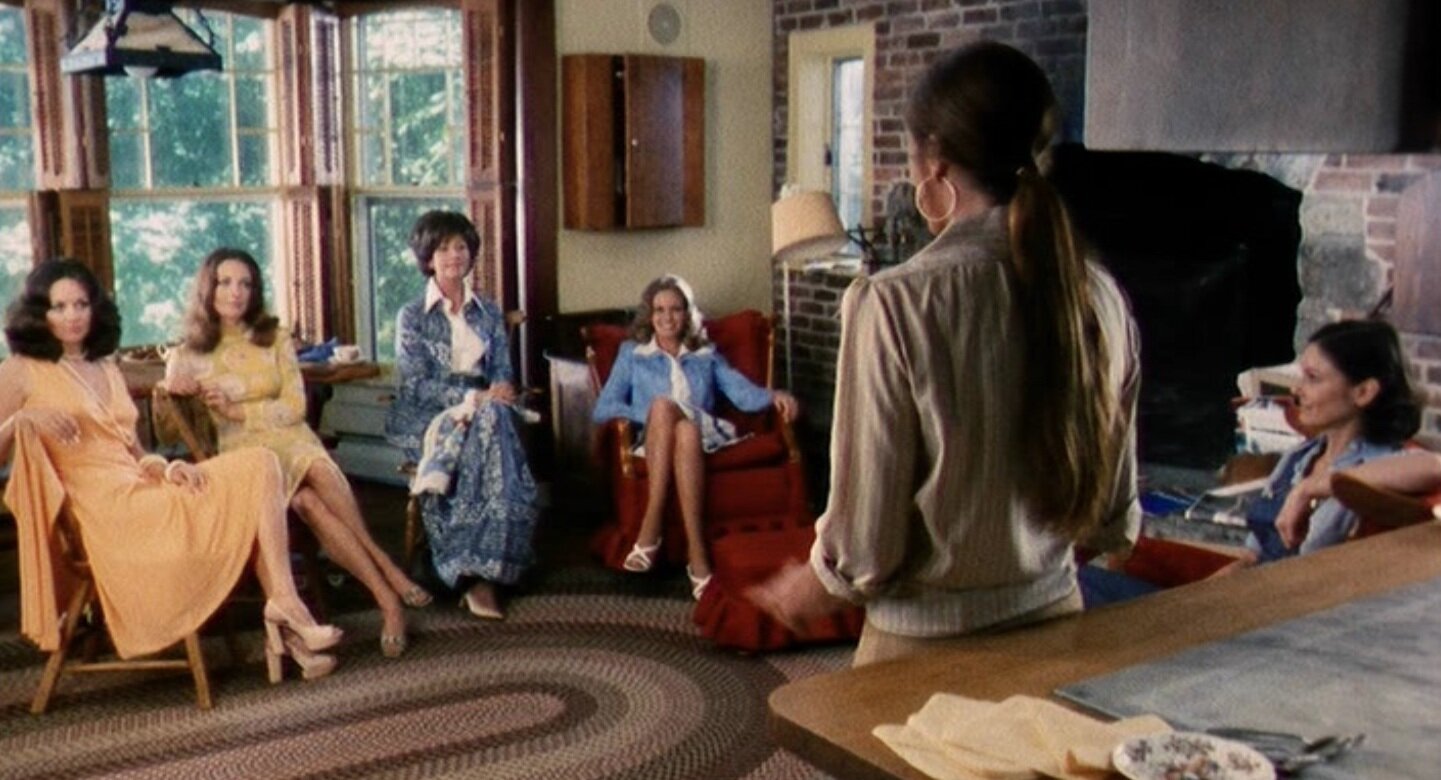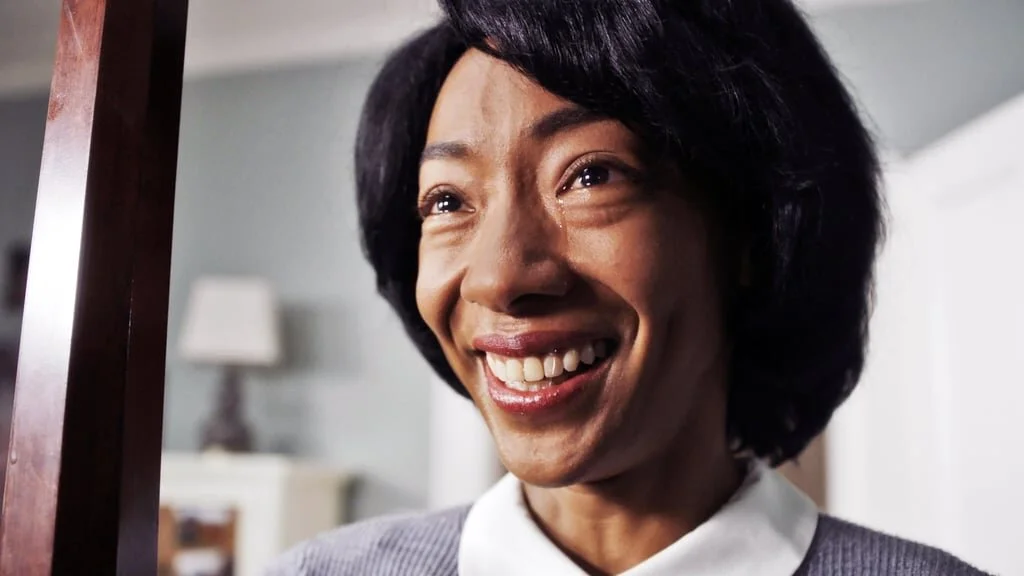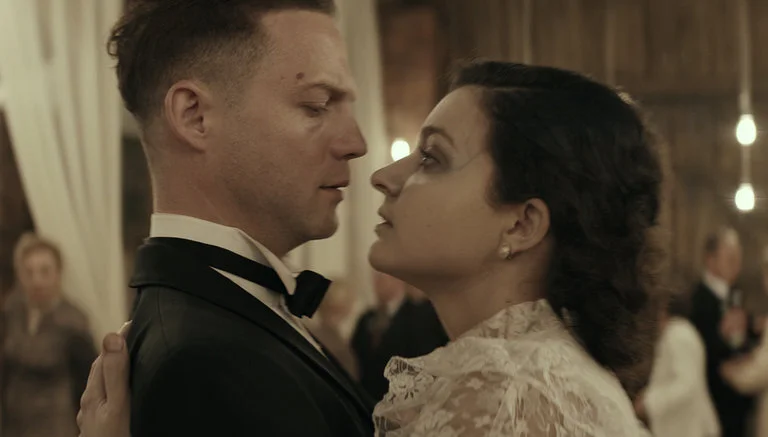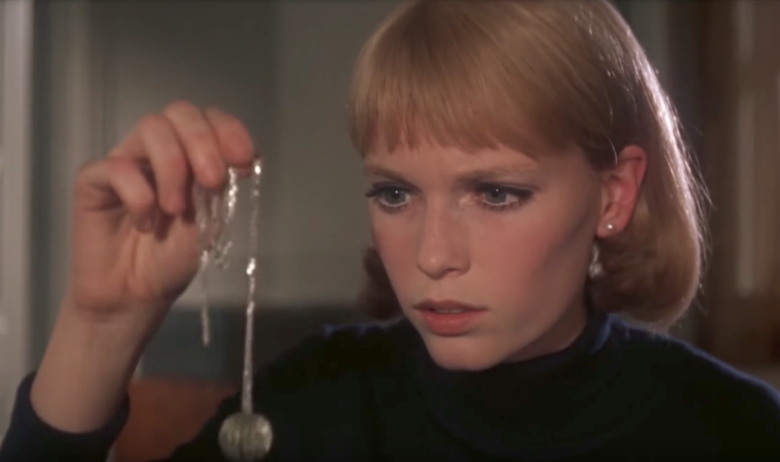Grotesque Comedy, Part 2: Get Out of Stepford
BEWARE SPOILERS
We go into every post assuming you’ve already watched the films being discussed.
Get Out (2017) is sadly unavailable on any streaming service without a premium subscription as of this writing (6/20/2021).
Plenty of folks have noted the many, many nods and homages Jordan Peele’s Get Out (2017) makes to Bryan Forbes’ Stepford Wives (1975) and Ira Levin’s 1972 novel of the same name. They’re usually treated like Easter eggs--fun little details that make you go, “Oh hey!”--but those connections go much deeper.
While not technically an adaptation or a remake, Get Out re-envisions The Stepford Wives--both the 1972 novel and the 1975 film--in what you could call a remake in spirit. (Oh, and it rightly ignores the 2004 atrocity.)
Forbes’ film and Levin’s novel dealt with feminist themes of gender power dynamics, ownership of female bodies, and the objectification of women. Get Out builds on how those issues intersect with racial power dynamics, ownership of Black bodies, and racist ideas of Black people as animals.
But Peele’s up to more than just swapping Women’s Liberation for Black Emancipation. He gives us a more hopeful film, lighter and funnier than The Stepford Wives, but at the same time heavier and more horrifying.
Lies & Allies
Meg talked a bit last week about Betty Friedan and her influence on Stepford. Drawing from Friedan’s The Feminine Mystique, Levin’s novel
satirizes the mid-century, middle-class, white American attitude that keeping house, raising kids, and meeting their husbands’ sexual fantasies is how women find fulfillment. The Stepford Wives is about the grotesqueness of a world that suppresses women’s creativity, intellect, and independence.
The Feminine Mystique and Friedan are widely credited for sparking second wave feminism in the United States, but her legacy is complicated by a tunnel focus on middle-class white women, to the dismissal of other marginalized groups. The Atlantic’s Ashley Fetters breaks down what she says are Friedan’s four main problems: racism, classism, homophobia, and a lot of lies.
Still, The Feminine Mystique’s influence on Levin’s novel can’t be ignored. In particular, he drew on her idea that, after having won the rights to education, to vote, and to hold careers, women had been pushed into housewife roles by cultural institutions and attitudes in academia, women’s schools, women’s magazines, and advertising, all of which were effectively helmed by men.
Levin’s Stepford is full of women obsessed with brand-name cleaning products, often sounding like actors in commercials for “detergents and floor wax, … cleansers and shampoos and deodorants.” In a cringe-inducing scene created for the 1975 film to get this idea across, Joanna (Katherine Ross) and Bobbie (Paula Prentiss), one of her only allies in town, have managed to gather, after much wrangling, a group of women for a “consciousness raising session.” The idea is to get the women of Stepford sharing their experiences and challenges as women in a man’s world. They’re hesitant to talk, until Joanna finally gets the conversation started. She and Charmaine (Tina Louise) are quickly interrupted by one wife’s concern that she just doesn’t have enough time in the day to do all her housework. Another Stepford wife chimes in to tell her all about Easy On spray starch. “It must save me half an hour a day, at least. You'll never run short of time again. I guarantee it.”
Taking this idea in a different but similar direction, the Black people Chris (Daniel Kaluuya) meets in Get Out (with the obvious exception of his best friend Rod (Lil Rel Howery)) are happy and content as a housekeeper, a groundskeeper, and a kept husband. Rather than the happy housewives of Stepford, the Black people in Get Out fill the roles of happy servants.
Chris tries at different points to talk to them. After the housekeeper Georgina (Betty Gabriel) offers a bizarre and unconvincing explanation for why she unplugged his nearly dead phone, Chris lets it go and tries to smooth things over with a half-joke: “Well, all I know is sometimes, being around too many white people makes me nervous.” Georgina doesn’t laugh. For a moment, she seems to lose herself in painful thought as a tear falls from her eye. She suddenly collects herself:
Oh no, no, no, no, no, no... Aren’t you something? That’s not my experience. Not at all. The Armitages are so good to us; They treat us like family.
When Chris says to the groundskeeper Walter (Marcus Henderson) while the man’s chopping wood, “They working you good out here, huh?” Walter replies, “Nothing I don’t want to be doing.”
Then, during a garden party scene parallel to the one in The Stepford Wives, Chris tells Logan King, the man who’s taken over the body of Andre Hayworth (LaKeith Stanfield), “It’s good to see another brother around here.” But instead of the kind of knowing response you’d expect, Logan seems confused, pausing briefly before realizing, “Yes, of course it is.” (It gets even weirder when Chris reaches his fist out for a bump, and Logan wraps his hand around it.)
And finally, accosted by a group of white people and a Japanese man asking whether “being African American has more advantages or disadvantages in the modern world?” Chris gets Logan’s attention, looking for an ally in this intensely unsettling moment. But Logan offers a perplexing response:
The African American experience for me, has been, for the most part, very good... It’s hard to be too specific as I haven’t much desired to leave the house in a while. … The chores have become my sanctuary.
Like the Stepford women, the Black people here embrace servitude. And like Joanna, Chris is left feeling alone and insane, relying on his partner Rose (Allison Williams) to help see him through this experience.
Unfortunately, Rose, like Joanna’s Walter, is not the ally she seems to be. Both characters are directly involved in their respective evil plots. As Meg noted last week, Walter is far more insidious in Levin’s novel than in the 1975 film. Like Rose under her mask of wokeness, he performs the ally role to sinister perfection, hiding his murderous misogyny under a feminist mask.
Toward the beginning of Levin’s novel, Walter tells Joanna he’s decided to join Stepford’s Men’s Association because “too many things are centered there to just opt out of it.” He assures her:
I spoke to some of the men on the train. … They agree that the no-women-allowed business is archaic. But the only way to change it is from inside. So I’m going to help do it.
Joanna finally gives in when he says if things haven’t changed in six months, he’ll quit and march with her in protest.
Early in Get Out, when Rose is talking to a cop (John Aprea) after she’s hit a deer on the road, the officer asks to see Chris’ driver’s license. Rose performs her own brand of white knight allyship, demanding to know why he needs Chris’ ID when he wasn’t driving. Chris tells her it’s okay, but Rose stops him: “No, fuck that. He shouldn’t have to show you his ID because he hasn’t done anything wrong.” After a tense exchange followed by an even tenser silence, the officer lets them go.
Like The Stepford Wives’ Walter, Rose plays a part like a role in a play. Both use their privilege to “prove” that they’re allies, when in fact, they’re manipulating their partners to serve their own bigoted, psychopathic, murderous goals.
Beasts & Sex Toys
When Chris first meets Dean (Bradley Whitford), Rose’s father, right after she’s hit that deer, Dean goes on a tirade:
You know what I say? I say one down, a couple hundred thousand to go. I don’t mean to get on my high horse, but I’m telling you, I do not like the deer. I’m sick of it; they’re taking over. They’re like rats. They’re destroying the ecosystem. I see a dead deer on the side of the road and I think, “that’s a start.”
The film fixates on deer elsewhere too, riffing on racist ideas of Black people as animals, “black bucks” out to covet white women, “beasts” whose superhuman “genetic makeup” has to be controlled, whose bodies are like livestock to be auctioned to the highest bidder.
The time Chris spends listening to the pained moans of the deer Rose hits, his staring at the mounted buck’s head while held prisoner, his conversation with Jeremy (Caleb Landry Jones) about mixed martial arts, and his conversations with nearly every white person in the film--they all circle around those ideas, telling the audience that the Armitages and their community view Chris as an animal and a commodity.
The Stepford wives, as we all now know, are robots built to replace the real women murdered by the Stepford husbands. They’re housekeeper sexbots built by Dale “Diz” Coba (Patrick O’Nea), who used to build animatronics at Disneyland. During the scene in which we meet Diz, the Men’s Association is at Joanna and Walter’s home, supposedly to talk barn dances and cake walks, but as soon as Joanna leaves to check on the kids, Ike Mazzard (William Prince) passes around his drawing pad, showing off concept art for a Joanna sexbot.
In Get Out, instead of robot sex slaves (though Rod has his suspicions), the Black people Chris meets are the flesh-and-blood bodies of abducted men and women whose conscious minds have been replaced by those of rich, old, white people. Their own minds have been pushed down to the “Sunken Place,” a dark void inside the unconscious where, “You’ll be able to see and hear what your body is doing, but your existence will be as a passenger … an audience.”
Mirroring the scene of Mazzard showing off his sexbot concept art, after being freaked out by a series of incidents during the Armitage garden party, Chris goes for a walk with Rose while the partygoers stay behind and pretend to play Bingo during a silent auction for ownership of Chris’ body.
Like The Stepford Wives robot sex slaves, the idea of white people literally putting their brains inside Black people’s heads seems laughable, but it’s underpinned by intense body horror, existential dread, and the insanity of self-doubt rooted in a history of racial terror. On its face, the concept is absurd to the point of comedy, but that’s part of what makes it horrifying to its core: these women, and these Black people, are treated like property, like livestock and sex toys.
Body & Mind
During Logan’s bizarre monologue about “the African American experience,” Chris tries discretely to snap a picture of him with his phone. But when the flash goes off, Logan’s eyes go dark and starry--a glimpse into the terrifying effects of being condemned to the Sunken Place.
The glitch allows Andre, the man whose body Logan has stolen, to suddenly rise to the surface and take control. Andre tries desperately to warn Chris, “Get out! Get out! Get the fuck out of here!” before he’s dragged away.
Later, a recollected Logan returns and thanks God that Missy Armitage (Catherine Keener) was “here to calm me down.” The line evokes racist ideas of angry Black men whose bodies must be controlled through incarceration and violence--or in this case, hypnosis.
While on his walk with Rose after Logan’s “seizure,” Chris tells her about when his mother was hit by a car. He sat home watching TV while she lay on the road, bleeding to death. Manipulated by Missy’s hypnosis the night before, he fixates on the idea that, “If someone was looking for her, there was time. But no one was looking,” because he “did nothing.”
He was a kid who, stuck in his own head, didn’t call anyone because, “I don’t know. I thought if I did, it would make it real.” In the hypnosis scene, Missy uses this memory of Chris doing nothing to make him vulnerable to Rose’s manipulations and prepare him for brain surgery. In a sense, he’s already lost his body, his ability to act, to the Armitages’ crazy-making machinations.
Here again, Peele’s re-envisioning a Stepford scene. After Bobbie shows off her spotless kitchen, suddenly obsessed with housework and push-up bras, Joanna tells Walter that she thinks the women in Stepford are being mind-controlled. At his insistence, she sees a therapist, Dr. Fancher (Carol Eve Rossen), who in the 1975 film doesn’t necessarily believe Joanna. Still, she tries to help, telling her to “gather up your children, and you get the hell away. Don't tell your husband. Don't tell anyone. Just go wherever you feel safe.”
In the book, though, when Joanna explains her fears of the Stepford men, Fancher says she’s just dealing with the trauma of moving. She says Joanna sounds like a woman who,
with good reason, feels a deep resentment and suspicion of men. One who’s pulled two ways by conflicting demands … the old conventions on the one hand, and the new conventions of the liberated woman on the other.
Fancher says she wants to continue treating Joanna, to talk things out before she makes any rash decisions, and Fancher prescribes a tranquilizer to calm Joanna down. Whether intentionally or just because of the assumptions of psychiatry at the time, Fancher makes Joanna more vulnerable to the Stepford men’s gaslighting.
Missy’s therapy session with Chris, while more overtly sinister, does much the same. In both cases, the therapists take advantage of Joanna’s and Chris’ vulnerabilities and take control of their bodies, getting them to give up their own free will.
Horrific Satire: Comedy of The Grotesque
In an interview with The Criterion Collection’s Andrew Chan, Peele explains the difficulty of marrying horror and comedy in Get Out:
The subject is too serious to do a parody, but if the film is too heavy, then it would be no fun at all and audiences would be pissed. I set myself the goal of doing a thriller in the mold of Rosemary’s Baby and The Stepford Wives, something with an overarching satirical commentary. But I also wanted to have a release valve, which I created with the character of Rod, Chris’s friend.
More significant than the swapping of gender and race politics, Get Out’s ending differs dramatically from Levin’s and Forbes’ Stepford Wives. In Peele’s film, the villains get their comeuppance, and our hero Chris gets out alive. But after the dramatic showdowns with Georgina, then Walter, and finally Rose, red-and-blue flashing lights appear.
Having been shot by the man whose body Walter stole when he emerges during a glitch brought on by Chris’ camera flash, Rose reaches out and calls for help, and the immediate sense is that the police are about to arrest Chris--in fact, that was the original ending Peele had planned. Instead though, Rod, as the film’s “release valve,” shows up as a knight in shining “TS-mutha-fuckin-A” armor to save the day.
In the 1975 Stepford Wives, Joanna is murdered by her sexbot doppelganger, and in Levin’s novel, she’s murdered by sexbot Bobbie before she can warn Ruthanne, Stepford’s next victim.
Chris, though, not only escapes, he burns the racist Armitage legacy and their entire home to the ground. Peele revises the horrific ending of The Stepford Wives in favor of comedic, but far from silly, triumph.
As originally planned, the ending might have been horrifying, but audiences know that story all too well from the horrifying reality we’ve seen in police murders of Black people. Forcing us to watch it in our fiction too would have been cruel, even unimaginative.
In the end, Chris’ victory is deeply satisfying. He confronts the trauma that left him vulnerable to Missy’s Sunken Place, first, when he chooses to help Georgina after he hits her with the car. It’s a mistake, but one he needs to make. Then, confronted with a similar choice as Rose, bleeding to death, begs his forgiveness, he chooses rage over mercy and starts to choke her. He could kill her and walk away; after all, for a minute, there’s no one to stop him. But that would have been a dark ending of a different sort--one signaled with Rose’s seeming laughter as Chris strangles her. Rather than giving into his rage, Chris lets her go when Rod arrives.
Having emancipated himself from the Armitages and the Sunken Place, Chris gets into the car with Rod and leaves the woman who tried to enslave him bleeding to death on the side of the road--a symbol of his final victory over the trauma that first robbed him of his ability to act, and a triumphant revision of the tragic ending of The Stepford Wives.















